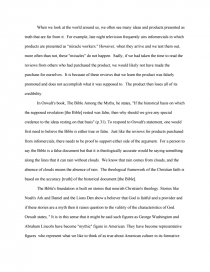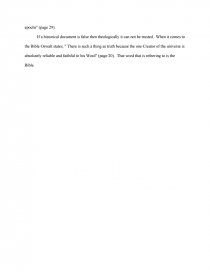Bible Among Myths
Essay by pacsuneg • January 22, 2014 • Essay • 442 Words (2 Pages) • 2,389 Views
When we look at the world around us, we often see many ideas and products presented as truth that are far from it. For example, late night television frequently airs infomercials in which products are presented as "miracle workers." However, when they arrive and we test them out, more often than not, these "miracles" do not happen. Sadly, if we had taken the time to read the reviews from others who had purchased the product, we would likely not have made the purchase for ourselves. It is because of these reviews that we learn the product was falsely promoted and does not accomplish what it was supposed to. The product then loses all of its credibility.
In Oswalt's book, The Bible Among the Myths, he states, "If the historical basis on which the supposed revelation [the Bible] rested was false, then why should we give any special credence to the ideas resting on that basis" (p.31). To respond to Oswalt's statement, one would first need to believe the Bible is either true or false. Just like the reviews for products purchased from infomercials, there needs to be proof to support either side of the argument. For a person to say the Bible is a false document but that it is theologically accurate would be saying something along the lines that it can rain without clouds. We know that rain comes from clouds, and the absence of clouds means the absence of rain. The theological framework of the Christian faith is based on the accuracy [truth] of the historical document [the Bible].
The Bible's foundation is built on stories that nourish Christian's theology. Stories like Noah's Ark and Daniel and the Lions Den show a believer that God is faitful and a provider and if these stories are a myth then it raises question to the valitity of the characteristics of God. Oswalt states, " It is in this sense that it might be said such figures as George Washington and Abraham Lincoln have become "mythic" figure in American. They have become representative figures who represent what we like to think of as true about American culture in its formative epochs" (page 29).
If a historical document is false then theologically it can not be trusted. When it comes to the Bible Oswalt states, " There is such a thing as truth because the one Creator of the universe is absolutely reliable and faithful to his Word" (page 20). That word that is refeering to is the Bible.
...
...

